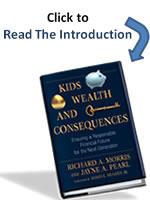
![]()
This atypical guide book, a combination of parenting and financial advice, helps financially well-off parents integrate financial responsibility into the next generation’s dreams. The “kids” in the book’s title actually refers to children who range in age from early teens through middle age. Authors Morris and Pearl note that an abundance of material comforts robs anyone of the pride and self-esteem garnered from hard work and earning things on one’s own and can fuel dysfunction and at-risk behaviors. They help parents (wealthy or not) understand how individuals define success, how money can actually hinder success, and the skills needed to be successful and happy (money is not one of them!). It is their parents’ numerous choices that determine how wealth will affect children. Morris and Pearl have arranged the book according to three main categories of choices: financial, intellectual, and spiritual or emotional. The chapters on financial choices look at how to prepare the family’s wealth, including portfolio management, calculating the family’s future and intergenerational equity goals, and structuring a trust and selecting appropriate trustees. The chapters on intellectual choices address how readers can prepare children for the wealth they will inherit through five financial values (e.g., differentiating between needs and wants and tolerating delayed gratification), developing healthy spending and saving patterns, and helping children to find a life purpose or to set realistic and meaningful goals. Fostering identity apart from wealth, the insidious effects of entitlement and guilt, and communication across generations are some of the topics related to spiritual and emotional choices. Pearl is a former senior editor at Family Business, a financial journalist at Forbes, and the author of Kids and Money. Morris, whose own family sold its eighty-year-old business is the principal of Resource for Ownership Intelligence Consulting and a professor at Lake Forest Graduate School of Management. Their combined experience grounds this guide with solid information. The concluding section integrates all of these choices into a plan of action. Other helpful inclusions are self surveys, inventories, checklists, guided questions, online games, and “teachable moments.” Although the authors insist that there’s “no substitute for good basic, active parenting,” this guide gives parents the tools to make it easier. They’ll not only learn how to shape future generations, but also gain insight into the meanings they themselves attach to wealth. Angela Leeper

